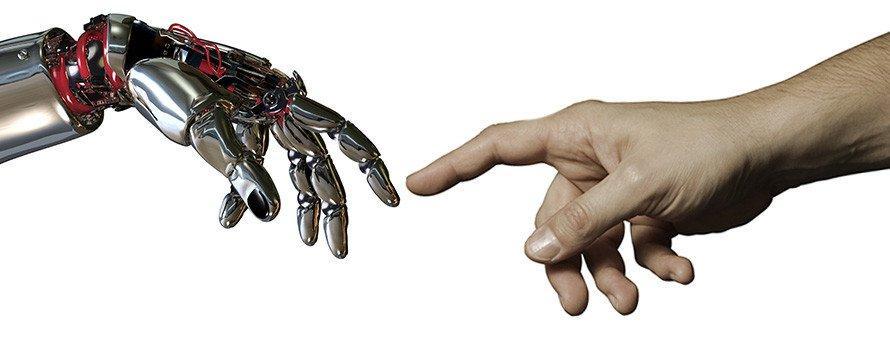Modern science, according to Carl Sagan, is a voyage into the unknown with a lesson in humility at every stop. The rise of Artificial Intelligence (AI) and its potential to disrupt our ‘way of life’ could very well be one such voyage through 2018.
Will AI challenge the fundamental notions of humanity: our biological needs, our social relations, and even our morality? Will humans, programmed by default to survive and reproduce, become a misfit in a world dominated by a complex array of algorithms?
Stephen Hawking, Bill Gates, Elon Musk, among others, think so. Musk even went a step further by donating US$10 million to the Future of Life Foundation, which is dedicated to making sure AI remains people-friendly. Simply put, they believe that if our machines equipped with Artificial Intelligence get too smart, it’s game over for the human race unless appropriate safety measures are built into the systems.
The Curious Case for ‘Existential Risk’
Doomsday declarations always make for good press. Hollywood sci-fi screenwriters love to narrate the dystopian fears of the future that face this existential risk where very bad things can happen in the near future to exterminate the human race as a result of technology gone bad.
In the 1820s, when world population was only a billion, Thomas Malthus, a leading economist in that period, predicted, “…nine parts in ten of the whole race of mankind were condemned to lives of abject poverty and grinding toil”. In 1894, a London Times columnist predicted that by 1950, London would get buried under nine feet manure.
History is littered with stories of doomsayers who have come and gone only to return with their shock and awe theories – to get it right at least once. The world, however, has neither outgrown its ability to feed itself nor has it pushed itself to the brink. In fact, for the past two centuries, we have been flooded with stories of human progress through continued strive for freedom and communication to get the test of time under control.
That said, dismissing the apprehensions of three of the world’s most intelligent people as “fear mongering” or a “figment of their imagination” could prove to be juvenile antics. Existential risk does exist, but that threat would have more to do with human arrogance than smart machines.
For the latest apocalypse cult, the biggest fallacy lies in its assumption that machines would evolve to be much smarter than humans and eventually turn something of a sadist psychopath hell bent on exterminating the very race (now a misfit in the scheme of things) that created them. In this light, let’s analyze what they are factoring in and, more importantly, what they are missing!
It’s Not “We” Versus “They”…
…in fact, we are they! As John Havens, the author of Heartificial Intelligence, succinctly puts it, “Since humans are programming the code for AI, this essentially means we have to codify our own values before programming them”.
The probability of the emergence of an intelligent system that could combine the power of computational algorithms with the wisdom and creativity of humans is much higher than the emergence of a rogue machine that sets out to exterminate the human race.
AI is neither ‘Artificial’ nor ‘Intelligent’
Machines have historically been very bad at anticipating human behavior – known to be predictably irrational. And there has been very little progress to suggest that’s even possible. Intelligence is much more than a complex array of algorithms. Logical thinking didn’t make humans superior – rather it’s their ability to straddle the infinite realm of illogical possibilities without knowing the results in advance.
Machines need humans to be smart. The most intelligent machines are those that receive constant input from humans. Google’s search engine, for example, is intelligent because we constantly feed it with inputs while using the worldwide web. Facebook can identify faces because millions of people upload so many pictures every day on the platform.
Fear Genuine Stupidity More than Artificial Intelligence
Stupid humans are a more potent existential threat than smart machines. For example, if the current trends are an indicator, autonomous cars will soon replace stupid humans on the steering wheel, which should reduce road accidents significantly – 90% of which are attributed to human errors. No nukes have killed a human until a megalomaniac pressed the button. Theoretically, we ought to fear Facebook more than our average robot.
Caveat: Predicting the Future is a Tricky Business
The world’s most intelligent people at the helm of the AI-driven apocalypse cult seem to be way off the mark. Simply because no prediction model is remotely capable of factoring in human ingenuity and no one still doesn’t understand how human intelligence works. For the same reasons, it’s difficult to say with conviction that we aren’t a few more algorithms away from developing it.
However, ‘existential rewards’ far outweigh ‘existential risks’. The future thus seems less likely to be a man versus machine scenario. Machines are most likely to remain an extension of humans, amplifying their ability towards achieving greater heights. Or we could see the emergence of a human-machine hybrid with humans retaining the core decision-making of surviving and reproducing.
2018 will certainly provide a peek into the future in a big way.



Leave your comments
Post comment as a guest